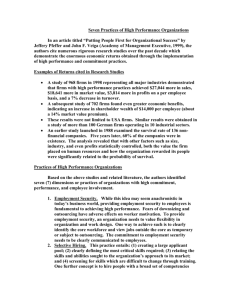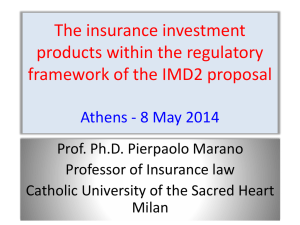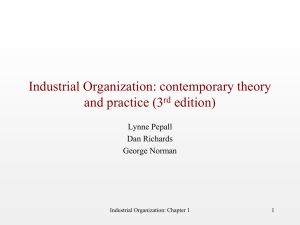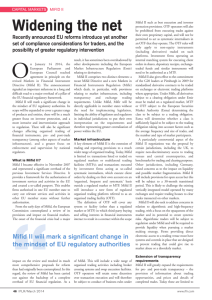MiFID 2: investor protection - Freshfields Bruckhaus Deringer
advertisement
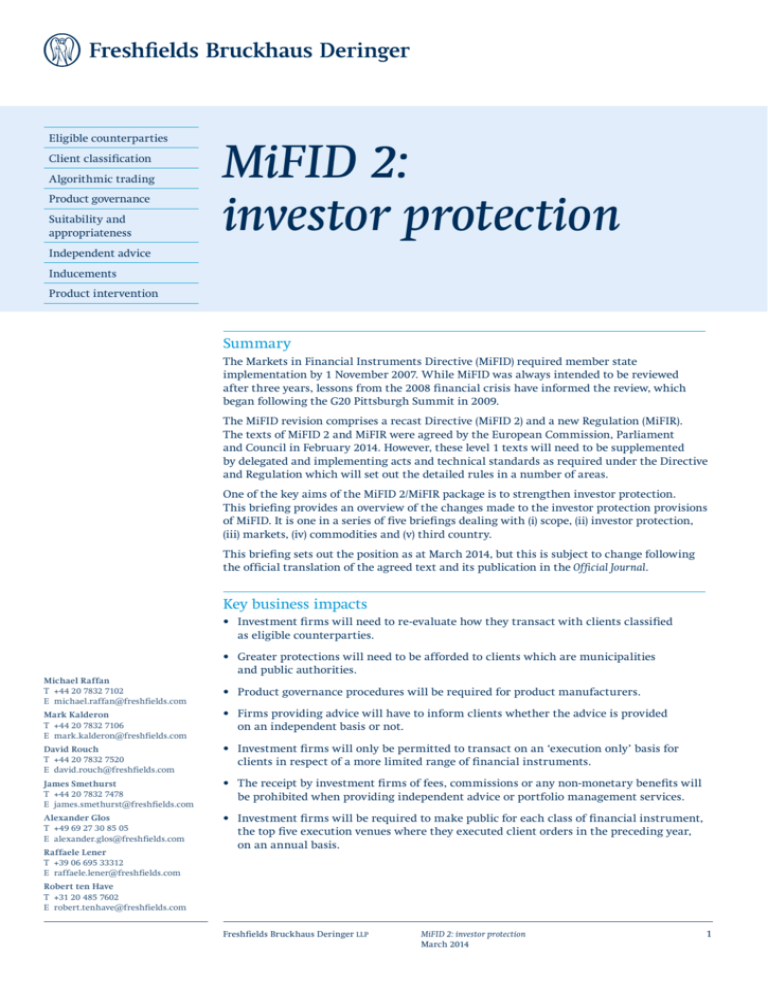
Eligible counterparties Client classification Algorithmic trading Product governance Suitability and appropriateness MiFID 2: investor protection Independent advice Inducements Product intervention Summary The Markets in Financial Instruments Directive (MiFID) required member state implementation by 1 November 2007. While MiFID was always intended to be reviewed after three years, lessons from the 2008 financial crisis have informed the review, which began following the G20 Pittsburgh Summit in 2009. The MiFID revision comprises a recast Directive (MiFID 2) and a new Regulation (MiFIR). The texts of MiFID 2 and MiFIR were agreed by the European Commission, Parliament and Council in February 2014. However, these level 1 texts will need to be supplemented by delegated and implementing acts and technical standards as required under the Directive and Regulation which will set out the detailed rules in a number of areas. One of the key aims of the MiFID 2/MiFIR package is to strengthen investor protection. This briefing provides an overview of the changes made to the investor protection provisions of MiFID. It is one in a series of five briefings dealing with (i) scope, (ii) investor protection, (iii) markets, (iv) commodities and (v) third country. This briefing sets out the position as at March 2014, but this is subject to change following the official translation of the agreed text and its publication in the Official Journal. Key business impacts • Investment firms will need to re-evaluate how they transact with clients classified as eligible counterparties. Michael Raffan T +44 20 7832 7102 E michael.raffan@freshfields.com • Greater protections will need to be afforded to clients which are municipalities and public authorities. • Product governance procedures will be required for product manufacturers. Mark Kalderon T +44 20 7832 7106 E mark.kalderon@freshfields.com • Firms providing advice will have to inform clients whether the advice is provided on an independent basis or not. David Rouch T +44 20 7832 7520 E david.rouch@freshfields.com • Investment firms will only be permitted to transact on an ‘execution only’ basis for clients in respect of a more limited range of financial instruments. James Smethurst T +44 20 7832 7478 E james.smethurst@freshfields.com • The receipt by investment firms of fees, commissions or any non-monetary benefits will be prohibited when providing independent advice or portfolio management services. Alexander Glos T +49 69 27 30 85 05 E alexander.glos@freshfields.com • Investment firms will be required to make public for each class of financial instrument, the top five execution venues where they executed client orders in the preceding year, on an annual basis. Raffaele Lener T +39 06 695 33312 E raffaele.lener@freshfields.com Robert ten Have T +31 20 485 7602 E robert.tenhave@freshfields.com Freshfields Bruckhaus Deringer LLP MiFID 2: investor protection March 2014 1 • Greater transparency will be required in relation to bundled services. • Additional information (in particular, in relation to costs and charges) will need to be provided when providing services to clients. • There are new provisions for the recording of telephone and electronic communications. • ESMA, the EBA and home state regulators will have the power to ban or restrict the marketing, distribution or sale of certain financial instruments. Eligible counterparties The following provisions will be extended to eligible counterparties: • the obligation to act honestly, fairly and professionally (although the obligation to act in accordance with clients’ best interests is not extended to eligible counterparties) and to communicate in a way that is fair, clear and not misleading; • information requirements that apply when providing investment services; and • periodic reporting requirements. Firms are likely to need to amend policies and procedures in order to extend their scope of application to eligible counterparties and will need to consider providing eligible counterparties with terms of business. Client classification It will no longer be possible under MiFID 2 for investment firms to automatically treat municipalities and local public authorities as professional clients or eligible counterparties unless they have opted to be treated as such and the firm has assessed them as having the requisite knowledge and experience. Member states will be given the option of adopting specific criteria for the assessment of the expertise and knowledge of these bodies when they ask to be treated as professional clients (which can be alternative to or additional to the criteria specified in MiFID 2). The difficulty in certain cases of distinguishing between ‘regional governments’ (which can be treated automatically as professional clients) and ‘public sector bodies, local public authorities and municipalities’ (which must be opted up) will be emphasised. Firms will need to decide whether they are willing to bear the cost of ‘opting up’ these (historically litigious) clients or whether to treat them as retail clients. Product governance Firms which manufacture financial instruments for sale to clients will be required to maintain a product approval process. This must identify the target market for each product and ensure that all relevant risks to that target market are assessed and that the intended distribution strategy is consistent with the identified target market. The target market and performance of products should be subject to periodic review. Firms which offer or recommend financial instruments which they do not manufacture must ensure that they understand the features of those products, including the identified target market. Product manufacturers must ensure products meet the needs of their identified target market and must take reasonable steps to ensure that the products are being distributed to that target market. Regulators in certain member states, including the UK, have already made clear that they expect procedures along these lines to be put in place but more specific and hard-edged requirements may emerge when implementing acts and technical standards are made. 2 MiFID 2: investor protection March 2014 Suitability and appropriateness Suitability requirements apply to advised services and portfolio management. There will be more onerous obligations on investment firms to determine suitability (including of bundled packages of products). Firms giving investment advice will be required to disclose whether they will provide the client with an ongoing assessment of suitability of the product. Periodic reports must be provided to clients, including an assessment of the suitability of the portfolio (unless, in the case of investment advisers, the firm is not carrying out a periodic assessment of suitability). Firms providing investment advice must provide clients with a statement specifying the basis on which the investment recommended is suitable for the client. Appropriateness requirements apply to non-advised services. The categories of ‘non-complex’ products will be narrowed, so that the ‘appropriateness’ test will apply: • to shares unless they are traded on a regulated market (or third country equivalent) or MTF and to shares in a non-UCITS collective investment undertaking or that embed a derivative; • to bonds and other forms of securitised debt unless they are traded on a regulated market (or third country equivalent) or MTF; • to all debt instruments that embed a derivative or ‘incorporate a structure which makes it difficult for the client to understand the risk involved’; • to structured UCITS; and • to structured deposits that ‘incorporate a structure which makes it difficult for the client to understand the risk of return or the cost of exiting the product before term’. At present the appropriateness requirement is effectively disapplied by the level 2 measures when dealing with professional clients and it remains to be seen whether this will continue to be the case. These changes will significantly affect the way in which certain products, such as structured UCITS, are sold to retail clients. Independent advice Firms will be required to inform their clients of whether their advice is being provided on an independent basis and whether the advice is based on a broad or more restricted analysis of different types of instruments. Independence will be determined on the basis of criteria including a firm’s assessment of a sufficiently diverse range of financial instruments (not limited to those provided by the firm or entities having close links with it) and on its not having taken third party inducements (see Inducements below). Firms will be required on request to demonstrate to competent authorities that individuals providing investment advice to clients possess the necessary knowledge and competence to do so. Regulators in the UK and other member states have already implemented reforms along these lines, although the concept of independent advice may be differently defined under MiFID 2. Freshfields Bruckhaus Deringer LLP MiFID 2: investor protection March 2014 3 Inducements Fees, commissions and non-monetary benefits received from or paid to third parties are currently allowed in limited circumstances under MiFID, although there has been some confusion and inconsistency in the application of the existing rules. Under MiFID 2, investment firms that provide advice on an independent basis or provide portfolio management will be banned from accepting or receiving fees, commissions or any monetary benefits paid or provided by any third party or a person acting on behalf of a third party (for example, issuers and product providers) relating to the provision of the service to clients. While following the thrust of the UK Retail Distribution Review, the scope of the MiFID 2 proposals is in some respects narrower (in applying only to advice that is independent) and in some respects broader (in applying to portfolio management). Minor non-monetary benefits may be allowed on the condition that they do not impair the ability of investment firms to act in the best interests of their clients. Such a permitted non-monetary benefit might include, for example, training on the features of a product. level 2 measures are expected to be introduced to complement the changes, including provisions to improve the quality of information provided to clients about inducements. It remains to be seen whether it will continue to be permissible for investment research and execution-related services to be provided to investment managers out of dealing commission through commission sharing and other arrangements. In addition, firms must not remunerate or assess the performance of their own staff in a way that conflicts with the firms’ duty to act in the best interests of their clients. Best execution MiFID 2 will introduce the following changes for investment firms executing client orders: • the execution policy must be provided in sufficient detail and in clear, easy to understand language; and • firms must summarise and make public, for each class of financial instrument, the top five execution venues where they executed client orders in the preceding year, on an annual basis. Firms should not receive any remuneration for routing clients’ orders to a particular trading or execution venue. Trading venues and systematic internalisers will be required to publish annual data relating to the quality of execution of transactions, which must be available publicly and at no extra charge. This should include information on price, costs, speed and likelihood of execution for individual financial instruments. The Commission is empowered to adopt level 2 measures in relation to the nature and extent of information to be provided by firms in relation to their execution policies. Firms will need to review and make more explicit the information about their order execution policies provided to clients. Applying some of the new requirements to asset classes such as fixed income securities and derivatives will not be straightforward. Bundled services MiFID 2 introduces requirements on investment firms offering an investment service together with another service or product as part of a package to inform clients whether it is possible to buy the different components separately, and to provide evidence on the costs and charges of each component. If the sum of the risk resulting from a packaged product is different from the risks of its component parts, the firm will need to provide a breakdown of the risks involved in those component parts. ESMA is expected to develop and maintain further guidelines for the assessment and supervision of cross-selling practices. This provision could have far reaching effects, applying to matters such as the provision of execution and investment research as part of a single service. 4 MiFID 2: investor protection March 2014 Information requirements Investment firms will be required to provide appropriate information to clients in relation to a number of matters, including proposed investment strategies and risks, whether the financial instrument is intended for retail or professional clients, execution venues, costs and associated charges, including cost of advice, cost of financial instruments recommended to the client, and third party payments. Costs and charges should be shown on an aggregated basis but an itemised breakdown must be provided if requested by the client. The Commission may adopt level 2 measures specifying the content of such disclosures, which are likely to be more extensive than those currently required and required to be provided on a regular basis. Telephone and electronic recording Investment firms will need to take all reasonable steps to record relevant telephone conversations, face-to-face meetings and electronic communications relating to actual or proposed own account and client transactions. Clients must be notified that telephone conversations will be recorded. The records must be sufficient to establish the terms of any order placed by a client as well as to detect potential market abuse. Such records will need to be kept for at least five years and provided to the client on request. The right of regulators to request the records of telephone or data traffic will be extended. Product intervention MiFIR will give ESMA, the EBA and member state regulators new powers to temporarily or (in the case of member states) permanently prohibit or restrict the marketing, distribution or sale of (in the case of ESMA and member state regulators) certain financial instruments or financial activity or (in the case of the EBA and member state regulators) certain structured deposits where there is a significant investor protection concern or a threat to the orderly functioning and integrity of the financial or commodity markets or financial stability. These powers will be available on a precautionary basis even before the financial instrument has been marketed to clients. When powers are exercised by member state regulators, they are required to notify other competent authorities and ESMA in advance. The Commission is to issue guidance to ESMA specifying the factors to be taken into account when making this assessment. The factors will include: (i) the complexity of the financial instrument bearing in mind its target market; (ii) how many such financial instruments will be issued or made available; (iii) how innovative the financial instrument is; and (iv) the amount of leverage it provides. This is a potentially powerful tool available to the European supervisory authorities and member state regulators with limited safeguards. It remains to be seen how the power will be exercised in practice and whether limits will be imposed on it by the courts. freshfields.com Freshfields Bruckhaus Deringer LLP is a limited liability partnership registered in England and Wales with registered number OC334789. It is authorised and regulated by the Solicitors Regulation Authority. For regulatory information please refer to www.freshfields.com/support/legalnotice. Any reference to a partner means a member, or a consultant or employee with equivalent standing and qualifications, of Freshfields Bruckhaus Deringer LLP or any of its affiliated firms or entities. This material is for general information only and is not intended to provide legal advice. © Freshfields Bruckhaus Deringer LLP, March 2014, 00508



